(#AmazonAdLink)  My book, (#AmazonAdLink) What is Hell? is now available (#AmazonAdLink) on Amazon. I am doing a series of podcast studies that focus on some of the content from the book. The studies look at the eight key terms that are often equated with hell, and about a dozen key passages that are thought to teach about hell.
My book, (#AmazonAdLink) What is Hell? is now available (#AmazonAdLink) on Amazon. I am doing a series of podcast studies that focus on some of the content from the book. The studies look at the eight key terms that are often equated with hell, and about a dozen key passages that are thought to teach about hell.
If you want to learn the truth about hell and what the Bible actually teaches about hell, make sure you get a copy of my book, (#AmazonAdLink) What is Hell?
Also, if you are part of my discipleship group, there will be an online course about hell as well.
In this article, we will be looking at a key passage from the Old Testament about the symbolism of fire in the Bible. By understanding how the Bible refers to fire, we can understand what the Bible means when it talks about burning in hell, or the fires of judgment.
The key text we want to study is Isaiah 33:10-16.
Scores of passages from the Hebrew prophets could be considered which provide insight into what a Jewish person thought when they heard someone teach about everlasting fire.
Isaiah 33:10-16 is representative of many of these prophetic texts, and provides perfect insight into what the Bible means when it refers to fire that comes upon people who disobey God.
Isaiah 33:10-16 and Burning in Fire. Is this hell?
Here is some of what Isaiah 33:10-16 says,
You shall conceive chaff, You shall bring forth stubble; Your breath, as fire, shall devour you. And the people shall be like the burnings of lime; Like thorns cut up they shall be burned in the fire. … The sinners in Zion are afraid; Fearfulness has seized the hypocrites: “Who among us shall dwell with everlasting burnings?” (Isa 33:11-12, 14).
There are three key insights to note from this text which help guide our understanding of all the others.
1. It is Not People who are Burned, but what People Produce
First, Isaiah writes that the people of Zion will “conceive” chaff and “bring forth” stubble.
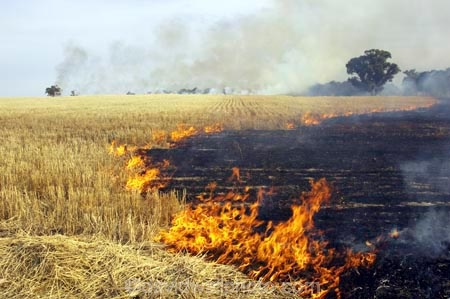 Isaiah uses terms of conception and childbirth to speak of the works that these sinners produce. It is not their lives that are chaff, stubble, and thorns, but what they produce with their lives.
Isaiah uses terms of conception and childbirth to speak of the works that these sinners produce. It is not their lives that are chaff, stubble, and thorns, but what they produce with their lives.
Of course, when your entire life’s work is destroyed, it may seem as if your life is destroyed as well. Indeed, when other prophetic passages (and later New Testament texts) talk about the destruction that comes upon people for their worthless way of living, it sometimes refers to the people themselves being destroyed, rather than the work of their hands.
This is how it feels when, at the end of your life, you discover that everything you have worked for has amounted to nothing.
This is not to say that many prophetic passages (including those in the New Testament) do not have the death and destruction of actual human lives in view. Many of them do, as we shall see. But in each case, the passages are always referring to physical death and temporal destruction rather than to everlasting death or eternal physical torture in flames of fire.
Some of the physical death and destruction during this life does indeed happen with literal flames when war comes upon a nation or its cities, and in such wars, many human beings do die. But once again, it is physical death that is in view, not eternal death in an everlasting place of torment.
2. The word “Everlasting” can refer to an event of limited duration with everlasting effects
But some point to Isaiah 33:14 as evidence that everlasting burning in the pit of hell is indeed what Isaiah has in view. This is the second important point to note from this text. While the term “everlasting” can indeed refer to a period of time that never ends, it can also refer to an event of limited duration which has effects that never end.
This second explanation provides the proper understanding for Isaiah 33:14.
In this text, people who are alive are saying that the works of their lives have been destroyed, and nobody in the future will know or hear of them.
They are afraid because they have lived hypocritical lives, and see that all they have lived and worked for will be consumed by fire, and will have no lasting value, significance, or remembrance for all eternity.
The fire that consumes these people and the works of their hands did indeed go out. It came upon them in 586 BC (when King Nebuchadnezzar invaded and destroyed Judah, along with Jerusalem and the temple) and has long since burned out.
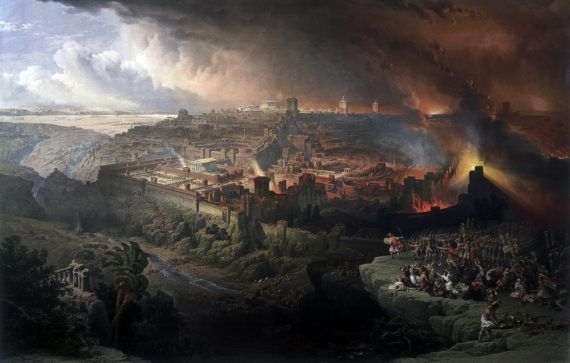
But none of their work remains. It burned to ashes long ago and has forever been forgotten.
Note that even though Zion was destroyed with “everlasting fire,” the nation, its capitol city Jerusalem, the temple, and even the people of Zion rose again from the ashes.
In 538 BC, the Persian ruler, King Cyrus, allowed the Hebrew people to return to their land where they eventually rebuilt the city and the temple.
Though the everlasting fire prophesied by Isaiah destroyed many of the people and the works of their hands, this was not the end of the Hebrew people themselves, or their influence upon this world. They rebuilt and regained much of their former glory.
Furthermore, of the people who died in 586 BC, nothing is said by Isaiah or anyone else regarding their eternal state or destiny. It is only the work of their lives which was burned away into nothingness.
In fact, it is possible that many of them are already with God, and will spend eternity with Him.
 We see evidence of this in the fact that Isaiah calls them “hypocrites.” A hypocrite is someone who acts in ways that are contrary to their stated identity. As such, anybody can be a hypocrite. Jesus often called some of His followers hypocrites (Matt 15:7; Luke 13:15), and Paul once referred to Peter and Barnabas as hypocrites (Gal 2:11-13).
We see evidence of this in the fact that Isaiah calls them “hypocrites.” A hypocrite is someone who acts in ways that are contrary to their stated identity. As such, anybody can be a hypocrite. Jesus often called some of His followers hypocrites (Matt 15:7; Luke 13:15), and Paul once referred to Peter and Barnabas as hypocrites (Gal 2:11-13).
Obviously, if someone is a hypocrite, this does not automatically mean they are truly part of the family of God, but it also does not necessarily mean that they will spend eternity in hell. It just means that they claim one thing about themselves but behave in ways that are opposite.
This was true of the people in Isaiah’s day, and many of these hypocrites will spend eternity with God.
3. The Fire is not from God, but from the People themselves
The third and final thing to note from Isaiah 33:10-16 is that the fire comes from the people themselves.
Isaiah writes, “Your breath, as fire, shall devour you” (Isaiah 33:11).
While numerous passages in Scripture indicate that the fires of judgment comes from God, a look behind the curtain reveals that the fires of judgment that come upon human beings for their sinful ways are always self-inflicted.
Sin bears its own punishment; rebellion carries within it the flames of ruin.
Actions have consequences, and when we live in ways that are contrary to the will of God, these actions lead to destruction and devastation.
This is why God warns us against sin in the first place. God warns us against sin, not because He is a killjoy and wants to ruin our fun with arbitrary laws, but because He knows how best to live this life and get the most out of it.
He also knows what happens when we do not live this life as He intends and seeks to warn us against such ways of living.
 When we sin, we hurt others and we hurt ourselves. And since God loves all of us, He does not want to see us get hurt, which is why He warns us about sin. Yet we often sin anyway, and so destruction comes.
When we sin, we hurt others and we hurt ourselves. And since God loves all of us, He does not want to see us get hurt, which is why He warns us about sin. Yet we often sin anyway, and so destruction comes.
This is what Isaiah is teaching.
The people were warned by the prophets, including Isaiah himself, about their sinful and hypocritical ways. But they continued to sin, and so the fire of judgment that comes upon them is a fire they lit themselves.
And while it is not always words that spark the flame, words are often the culprit, as Isaiah indicates. He says it is their “breath” that is the fire, which is a way of referring to the words that they speak.
Indeed, near the end of Isaiah’s life, King Hezekiah said some foolish words to the ambassadors from Babylon. He boasted to them about the treasures of the temple and showed them the riches that were within it.
As a result, Isaiah told Hezekiah that because he had said and done these things, Babylon would come against the city and destroy it (2 Kings 20:12-19), which is exactly what happened (2 Kings 24:1-16).
Eventually, the entire city, with the temple, was burned with fire, and its inhabitants were carted off into captivity (2 Kings 25:1-21).

Conclusion
So Isaiah 33:10-16 is a guiding paradigm for helping us understand all the passages in Scripture about fire.
As we will see, just like Isaiah 33:10-16, none of the passages which teach about the destruction of people in fire are referring to the everlasting torment of people in flames where they scream and burn for all eternity.
Instead, such texts refer to the worthless work of human hands that gets burned away by destructive forces in this world. All the work of their hands is turned to ash.
 When lime is burned in a fire or thorns are put to flame, nothing is left but a fine, white powder which blows away with the first puff of wind.
When lime is burned in a fire or thorns are put to flame, nothing is left but a fine, white powder which blows away with the first puff of wind.
So it will be for everything that some people have worked for in this life. As we keep this paradigm in mind, many of the New Testament passages which speak of fire make much more sense.
 Do you have more questions about hell? Are you afraid of going to hell? Do want to know what the Bible teaches about hell? Take my course "What is Hell?" to learn the truth about hell and how to avoid hell.
This course costs $297, but when you join the Discipleship group, you can to take the entire course for free.
Do you have more questions about hell? Are you afraid of going to hell? Do want to know what the Bible teaches about hell? Take my course "What is Hell?" to learn the truth about hell and how to avoid hell.
This course costs $297, but when you join the Discipleship group, you can to take the entire course for free.




 Since the book of James is likely one of the earliest New Testament writings, James is heavily reliant upon the Hebrew Scriptures. And since James was a leader in the Jerusalem church and a half-brother to Jesus, he seems to base his letter upon the teachings of Jesus in the Sermon on the Mount.
Since the book of James is likely one of the earliest New Testament writings, James is heavily reliant upon the Hebrew Scriptures. And since James was a leader in the Jerusalem church and a half-brother to Jesus, he seems to base his letter upon the teachings of Jesus in the Sermon on the Mount.
 So where is hell? It is here, on this earth.
So where is hell? It is here, on this earth.
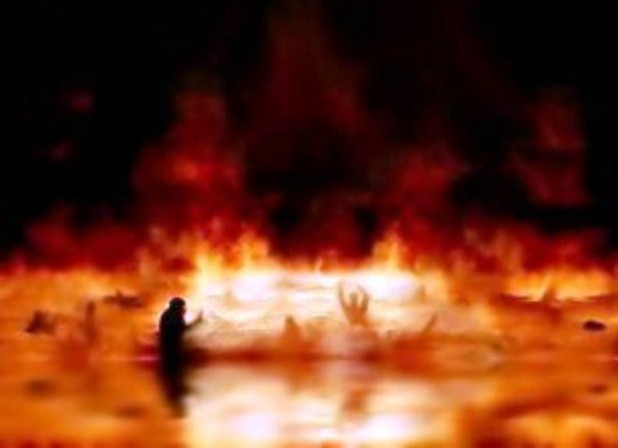



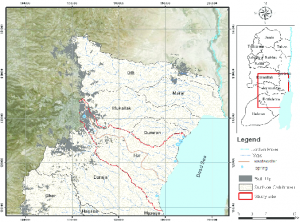 After the destruction of Jerusalem in 70 AD, the bodies of over one million Jews were thrown into the Valley of Hinnom outside of Jerusalem, where they were then burned. When the rains come, much that is in the valley is washed down into the Dead Sea through the Wadi an-Nar, or the “Streambed of Fire” (Spencer, (#AmazonAdLink)
After the destruction of Jerusalem in 70 AD, the bodies of over one million Jews were thrown into the Valley of Hinnom outside of Jerusalem, where they were then burned. When the rains come, much that is in the valley is washed down into the Dead Sea through the Wadi an-Nar, or the “Streambed of Fire” (Spencer, (#AmazonAdLink) 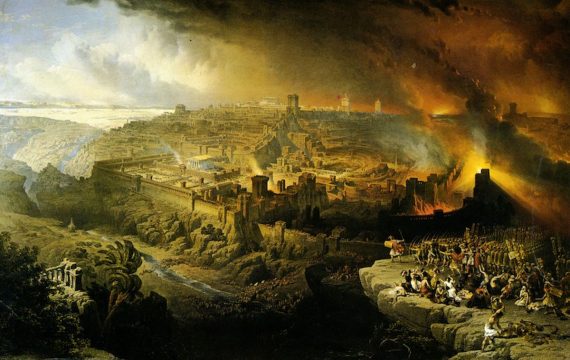

 Currently, we have a “way out” through death and resurrection. But if there is no death, there can be no resurrection, and so those who experience the eternal second death (living in the realm of death, but never dying) are living in a hell of their own making.
Currently, we have a “way out” through death and resurrection. But if there is no death, there can be no resurrection, and so those who experience the eternal second death (living in the realm of death, but never dying) are living in a hell of their own making. C. S. Lewis’ theological fantasy book, (#AmazonAdLink)
C. S. Lewis’ theological fantasy book, (#AmazonAdLink)  This way of living is not really “living,” however, and such people will ultimately find themselves separated, not only from God, but also from all other people. The Bible calls it the second death (Rev 21:8).
This way of living is not really “living,” however, and such people will ultimately find themselves separated, not only from God, but also from all other people. The Bible calls it the second death (Rev 21:8).
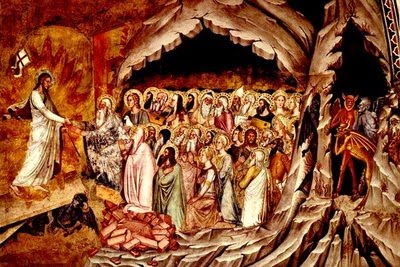
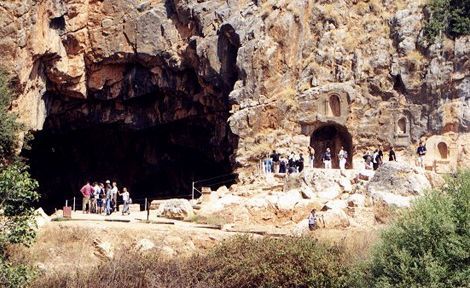
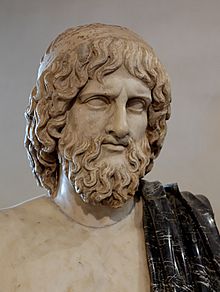 What is interesting about this is that the Greek god Hadēs was occasionally depicted in Greek mythology as carrying a key to the gates of the underworld. He kept the gates forever locked so that nobody who was within could ever escape.
What is interesting about this is that the Greek god Hadēs was occasionally depicted in Greek mythology as carrying a key to the gates of the underworld. He kept the gates forever locked so that nobody who was within could ever escape.

 In the LXX (the Greek translation of the Hebrew Old Testament), abussos is often used to translate the Hebrew word tehom, which means “the deep” and refers to the deepest parts of the sea (cf. Gen 1:2; 7:11; 8:2, 7; Psa 32:7; 35:7; 41:8; 104:6; Job 38:16; Jon 2:6; Isa 44:27; 51:10; 63:13; Ezek 26:19; 31:4, 15; Dan 3:55).
In the LXX (the Greek translation of the Hebrew Old Testament), abussos is often used to translate the Hebrew word tehom, which means “the deep” and refers to the deepest parts of the sea (cf. Gen 1:2; 7:11; 8:2, 7; Psa 32:7; 35:7; 41:8; 104:6; Job 38:16; Jon 2:6; Isa 44:27; 51:10; 63:13; Ezek 26:19; 31:4, 15; Dan 3:55). Similarly, to be delivered from the abyss is to be delivered from death in the sea (cf. LXX Psa 105:9; Jon 2:6; Isa 63:13).
Similarly, to be delivered from the abyss is to be delivered from death in the sea (cf. LXX Psa 105:9; Jon 2:6; Isa 63:13). Since the Bible nowhere else speaks of Tartarus, we must assume that Peter had the Greek and Roman mythology of Tartarus in mind when he wrote of it. In Greek mythology, the word tartarus spoke of two things. It was first of all the name of the one of the original primordial deities. However, the word tartarus also speaks of a place. In this way, the word tartarus is like hadēs, which also refers to a place and a god in Greek mythology.
Since the Bible nowhere else speaks of Tartarus, we must assume that Peter had the Greek and Roman mythology of Tartarus in mind when he wrote of it. In Greek mythology, the word tartarus spoke of two things. It was first of all the name of the one of the original primordial deities. However, the word tartarus also speaks of a place. In this way, the word tartarus is like hadēs, which also refers to a place and a god in Greek mythology.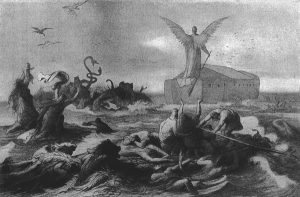 A second view is that Peter is referring to the flood which came upon the earth as a result of the sons of God having children with the daughters of men (Gen 6:1-4). The offspring of this union is referred to as the Nephilim, which might have also been the “giants” among men (Gen 6:4; Num 13:33; Deut 3:11; Josh 11:21-22; 1 Sam 17).
A second view is that Peter is referring to the flood which came upon the earth as a result of the sons of God having children with the daughters of men (Gen 6:1-4). The offspring of this union is referred to as the Nephilim, which might have also been the “giants” among men (Gen 6:4; Num 13:33; Deut 3:11; Josh 11:21-22; 1 Sam 17).
